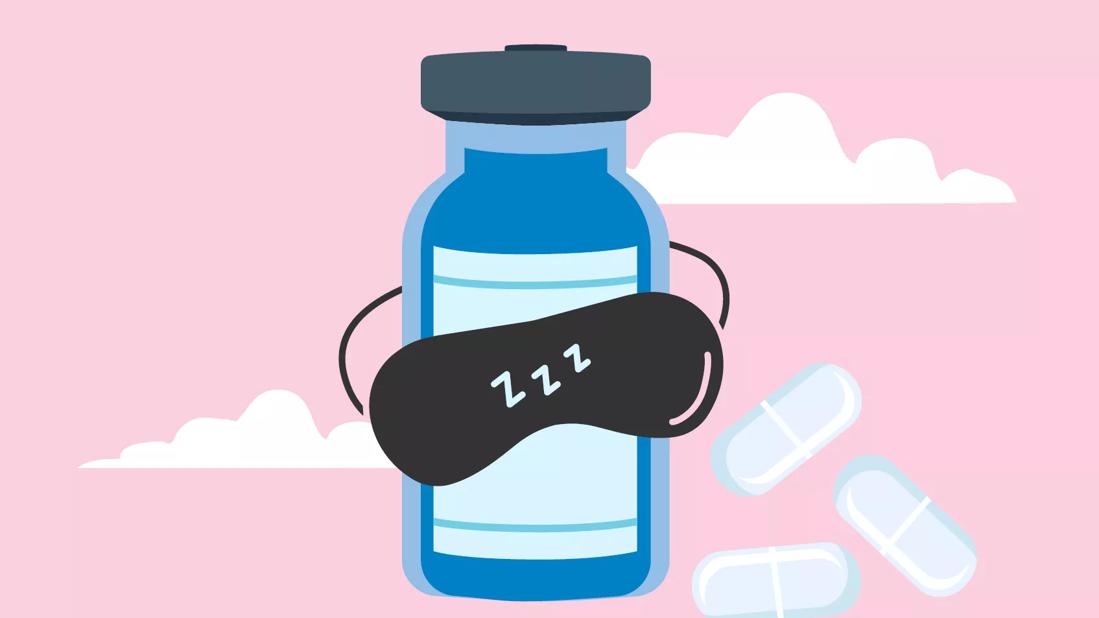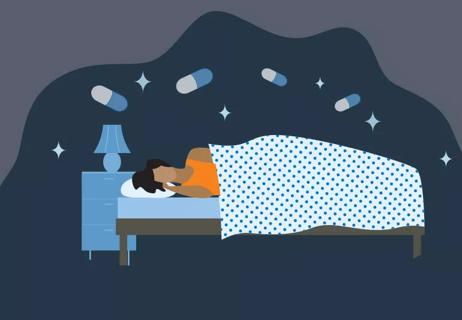This hormone helps your body prepare for sleep

Many people are over the moon about the sleep hormone melatonin. If you find yourself staring at the ceiling most nights wishing you could just fall asleep faster, melatonin sure sounds like a miracle cure for all of your deep-sleep woes. But there seems to be some confusion on if melatonin really works, how much you should take and how much is too much.
Advertisement
Cleveland Clinic is a non-profit academic medical center. Advertising on our site helps support our mission. We do not endorse non-Cleveland Clinic products or services. Policy
Melatonin is sold over the counter in a range of doses, from 1 milligram (mg) to 10 mg and higher. And while you may believe higher doses lead to better sleep, that’s not exactly the case. Plus, the right dosage can vary from person to person.
Sleep-medicine physician Lauren Goldman, MD, and clinical-health psychologist and behavioral sleep-medicine specialist Alicia Roth, PhD, share how melatonin works, who should take it and when you can use it for maximum effect.
Your body follows a circadian rhythm in which various physical, mental and behavioral processes are carried out depending on the time of day. In reaction to daytime and natural daylight, your brain releases the hormone serotonin, which regulates your mood, appetite and memory. At night, in response to darkness, your brain switches off serotonin and starts releasing melatonin. This hormone helps calm your body down and prepare for sleep by making you feel tired or drowsy.
“Once that sun goes down, your melatonin system turns back on and a couple hours later, your melatonin levels are high enough for you to be able to fall asleep,” explains Dr. Roth. “This is why in some places, like Ohio, our energy levels are lower during the winter because we don’t have a lot of natural sunlight during the day. So, we’re not as energetic, and we never quite get that burst of melatonin production at night.”
Advertisement
Melatonin works best for people who have a delayed circadian rhythm — like if you’re a night owl who prefers going to bed later and waking up later, but you have to go to sleep and wake early for your job, school or other life commitments. You can boost your melatonin levels in a couple of ways so you can fall asleep and wake up earlier. You can do this naturally by sticking to a routine sleep schedule, getting some natural light exposure first thing in the morning and avoiding bright lights and screen time before bed. But, if you need a little more help, you can always take a melatonin supplement, which is available in many forms including tablets, capsules and gummies.
Since melatonin is considered a supplement, it’s not regulated by the U.S. Food and Drug Administration (FDA). But if you’re still interested in using the supplement, in most cases, Dr. Goldman suggests using the lowest dose possible for the shortest amount of time to achieve your desired outcome. In general, melatonin can be used in two ways.
This method is meant to help you fall asleep faster in a very short amount of time. Dr. Goldman suggests starting with 1 mg, and then increasing that amount by 1 mg (not to exceed 10 mg) every week until you’ve reduced the amount of time it takes you to fall asleep. But you should know, this method isn’t super effective because you can easily interrupt the melatonin process.
“It’s important to note that it’s really easy to overcome the effect of melatonin,” says Dr. Goldman. “If you take it and then get on your phone, go on social media, play video games or if you have an overactive mind that’s racing or worrying, you will likely overpower the effect of melatonin.”
For this reason, it’s best if you take melatonin when you start feeling tired and make sure you allow your body to be at full rest when you take it.
This method is typically reserved for more chronic conditions. There are a number of circadian rhythm sleep disorders that can disrupt your sleep schedule. Maybe you work a night shift or rotate shifts periodically. Maybe you fall asleep very late or even into the early hours of the morning on a regular basis. If you experience any of these disorders, or if you’ve got jet lag, melatonin can be a good supplement to get you back on track.
For these more chronic cases, Dr. Goldman suggests working with a sleep medicine physician or behavioral sleep medicine specialist to create a sleep-wake schedule that may include the use of melatonin.
“Then, once you’re on that schedule, you might continue to take that melatonin for a little while just to make sure your body continues to keep that schedule you want,” says Dr. Roth.
Advertisement
Broadly speaking, Dr. Goldman doesn’t have recommendations for children when using melatonin. In most cases with teens or younger children, trouble falling asleep is a behavioral issue or it could be a sign of an underlying medical condition. In these cases, Dr. Goldman recommends working with a pediatrician or sleep medicine provider to diagnose the problem before using melatonin.
Everyone reacts differently, but in most cases, you’ll want to take melatonin about 30 minutes before bed because it takes about 20 to 40 minutes to work.
“It’s not a sedative, so it’s not going to knock you out,” notes Dr. Roth. “Melatonin is like a little dose of nighttime. It tells that melatonin system to turn on.”
If you’re interested in taking melatonin, or if you think you might have a sleep disorder, you should see your healthcare provider who can help diagnose and treat the problem.
If you take too much melatonin, or take it too late in the evening, you can cause yourself to be drowsy, sluggish or have delayed reaction times during the day when you should be more alert. Some common side effects of taking melatonin can include:
Advertisement
It’s also important to note that some sleep disorders, like insomnia, can gradually worsen when you take melatonin, especially if you’re taking higher doses (or taking it too early in the day or too late in the evening).
“A person who has trouble falling asleep or staying asleep no matter what time it is won’t benefit much from melatonin,” says Dr. Roth.
Melatonin works differently for everyone, and doctor recommendations vary based on your diagnosis and sleep history. With chronic conditions like insomnia or other similar sleep disorders, it’s best to see a sleep specialist to get a correct diagnosis and consider cognitive behavioral therapy or other treatments.
Advertisement
Learn more about our editorial process.
Advertisement

Tart cherry juice contains natural compounds that may support better sleep

Melatonin won’t stop birth control from doing its job, but the combo could cause unwanted side effects

This sleep supplement may have side effects, but dependency isn’t one

Too much of the supplement can lead to an upset stomach, vomiting and diarrhea

Does this supplement help you get more ZZZs?

What to expect after taking this increasingly popular sleep aid

The short answer from a sleep specialist

Wearing a scarf, adjusting your outdoor activities and following your asthma treatment plan can help limit breathing problems

Your diet in the weeks, days and hours ahead of your race can power you to the finish line

When someone guilt trips you, they’re using emotionally manipulative behavior to try to get you to act a certain way